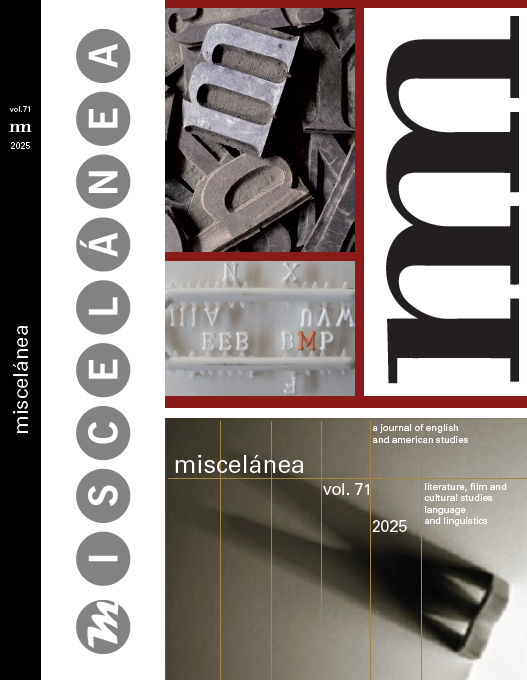Tainted by (White) Trash: Class, Respectability and the Language of Waste in Dorothy Allison and Bonnie Jo Campbell
DOI:
https://doi.org/10.26754/ojs_misc/mj.202510514Keywords:
Waste studies, Whiteness, Working class, White trash, RespectabilityAbstract
This article addresses the depiction of class, whiteness, dirt and respectability in the short stories “Meanest Woman Ever Left Tennessee”, by Dorothy Allison, and “Boar Taint”, by Bonnie Jo Campbell, from the perspective of waste studies and whiteness studies. Characters in these stories erect discursive barriers between themselves and others, deemed ‘white trash’ — a pervasive stigmatype connected to the working poor experience in the US. By enforcing hierarchies that conflate cleanliness and respectability, these characters seek to prove their adherence to unmarked forms of whiteness while resisting assimilation into the white trash category. The negotiation of (intra-)class divisions, especially between middle and working classes, exposes the malleability of social hierarchies predicated on relationships of waste. In the end, the protagonists’ rejection of white respectability re-signifies their association with waste and leads them to find pride and community in their working-class occupations, without necessarily embracing a purported white trash identity.
Display downloads
References
ALLISON, Dorothy. 2018. Trash. Penguin Books.
CAMPBELL, Bonnie Jo. 2009. American Salvage. W.W. Norton.
DOUGLAS, Mary. (1966) 2001. Purity and Danger. An Analysis of Concepts of Pollution and Taboo. Routledge.
DYER, Richard. 2017. White. Routledge. DOI: https://doi.org/10.4324/9781315544786
FORRET, Jeff. 2006. Race Relations at the Margins: Slaves and Poor Whites in the Antebellum Southern Countryside. Louisiana State U.P.
GRUÉ, Mélanie. 2014. “The Internal Other: Dorothy Allison’s White Trash”. Otherness: Essays and Studies 4 (2): 31-50.
HARKINS, Anthony. 2004. Hillbilly: A Cultural History of an American Icon. Oxford U.P. DOI: https://doi.org/10.1093/acprof:oso/9780195189506.001.0001
HARTIGAN JR., John. 1997. “Name Calling. Objectifying ‘Poor Whites’ and ‘White Trash’ in Detroit”. In Newitz, Annalee and Matt Wray (eds.): 41-56.
HARTIGAN JR., John. 2005. Odd Tribes. Toward a Cultural Analysis of White People. Duke U.P. https://doi.org/10.1515/9780822387206. DOI: https://doi.org/10.1515/9780822387206
HAWKINS, Gay. 2006. The Ethics of Waste. How We Relate to Rubbish. University of New South Wales Press.
HUBBS, Jolene. 2022. Class, Whiteness, and Southern Literature. Cambridge U.P. DOI: https://doi.org/10.1017/9781009250627
ISENBERG, Nancy. 2017. White Trash. The 400-Year Untold History of Class in America. Atlantic Books.
KATZ, Michael B. 2013. The Undeserving Poor. America’s Enduring Confrontation with Poverty. Oxford U.P.
KOTHARI, Geeta. 2008. “A Conversation with Bonnie Jo Campbell”. The Kenyon Review July 24. https://kenyonreview.org/conversation/bonnie-jo-campbell/. Accessed 16 April 2024.
LIBOIRON, Max, and Josh LEPAWSKY. 2022. Discard Studies. Wasting, Systems, and Power. The MIT Press. DOI: https://doi.org/10.7551/mitpress/12442.001.0001
MELLETTE, Justin. 2021. Peculiar Whiteness: Racial Anxiety and Poor Whites in Southern Literature, 1900-1965. University Press of Mississippi. DOI: https://doi.org/10.14325/mississippi/9781496832535.001.0001
MORRISON, Susan Signe. 2015. The Literature of Waste: Material Ecopoetics and Ethical Matter. Palgrave Macmillan.
MURPHY, Bernice M. 2013. The Rural Gothic in American Popular Culture: Backwoods Horror and Terror in the Wilderness. Palgrave Macmillan. DOI: https://doi.org/10.1057/9781137353726
NEWITZ, Annalee and Matt WRAY. 1997. “Introduction”. In Newitz, Annalee and Matt Wray (eds.): 1-12.
NEWITZ, Annalee and Matt WRAY. (eds.) 1997. White Trash. Race and Class in America. Routledge.
OLER, Andy. 2019. Old-Fashioned Modernism: Rural Masculinity and Midwestern Literature. Louisiana State U.P.
ORTEGA, Alejandra. 2023. “The Cultural Critique of American Patriarchal Capitalism in American Salvage”. In Oler, Andy, Ross Tangedal and Lisa DuRose (eds.) Michigan Salvage: The Fiction of Bonnie Jo Campbell. Michigan State U.P.: 46-58. DOI: https://doi.org/10.14321/jj.725856.9
SMITH, Dina. 2004. “Cultural Studies’ Misfit: White Trash Studies”. The Mississippi Quarterly 57 (3): 369-87.
WRAY, Matt. 2006. Not Quite White. White Trash and the Boundaries of Whiteness. Duke U.P. DOI: https://doi.org/10.1515/9780822388593
ZIMRING, Carl A. 2015. Clean and White. A History of Environmental Racism in the United States. New York U.P. DOI: https://doi.org/10.18574/nyu/9781479858033.001.0001
Published
Issue
Section
License
Copyright (c) 2025 Sara Villamarin-Freire

This work is licensed under a Creative Commons Attribution-NonCommercial 4.0 International License.
How to Cite
Accepted 2025-01-22
Published 2025-06-26


